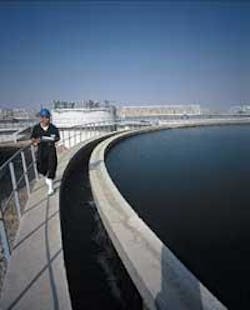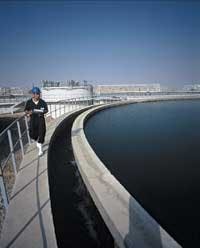Creative public-private solutions needed, not misleading rhetoric
By Dr. Jennifer Bremer
Book Review
Blue Gold: The Fight to Stop the Corporate Theft of the World's Water
By Maude Barlow and Tony Clarke
(New York: New Press, 2002)
The authors are at their best when calling attention to the severity, magnitude, and diversity of water crises around the world. Ranging over the global landscape, they bring together interesting macro-data and intriguing local examples to argue for greater attention to water. Their overview pulls together the dangers of unsustainable aquifer drawdown with the negative impact of commercial agriculture on water quality, poorly managed urban systems with an increasingly difficult balancing act between urban, agriculture, and natural demands for water.
Too often, however, their apocalyptic zeal overtaxes their paper-thin techno-savvy. In one such passage, they cite an analysis mysteriously linking Slova-kia's urbanisation to decades of declining rainfall, and then build on this slim reed to foretell global disaster. As an indication of the uneven quality of their analysis, this passage merits quoting at length:
"Terrifyingly, the authors have been able to make some speculations about what this means globally. The world is urbanizing and therefore being paved over at about the same rate as Slovakia. This means that the continents are losing about 1,800 billion cubic meters ... of fresh water a year, thus causing the oceans to rise by 5 millimeters ... annually. If this trend continues, over the next hundred years, the land mass will lose about 180,000 billion cubic meters of fresh water, which is approximately equivalent to the volume of water of the whole hydrological cycle."
Barlow and Clarke have never met a private investment they like, from urban water supply and bottled water, to irrigation, hydropower or industrial applications. They rehash every hoary anti-globalisation charge of corporate or World Bank abuse, even those reaching back 50 years or more. They criticise the late Azurix and brand its ill-fated parent, Enron, a member of the global water cartel. Though published in 2002, the book somehow fails to note Enron's downfall in 2001.
Never mind that, in the real world, the leading water companies - Vivendi, Suez, and RWE among them - are struggling to keep their developing-country investments in the black. In the Blue Gold world, monopoly power is right around the corner. The authors' anti-corporate screed reaches a peak in their attack on alleged water company collusion to form a global cartel, which Barlow and Clarke see as poised to capture monopoly power over the world's water. Once in charge, this cartel will drive up water prices for profit or deny water altogether to low-income consumers.
Only the most paranoid could fear that companies currently serving a worldwide total of 100 million consumers - less than two percent of the global consumer base - are poised to gain monopoly powers. Misinterpreting World Trade Organisation (WTO) rules and misreading water markets, however, the authors argue that trade rules will require communities to turn over their water systems to corporations and, once this is done, will forever prevent them from regulating, controlling, or resuming management over these systems. This is not only nonsense, but dangerous nonsense.
While focusing on this alleged cartel-in-the-making, the authors attack as well every other actor in the water sector, whether looming bottled-water powers Coke and Pepsi, would-be lords of water pipelines (dangerous even in their larval or "pipedream" phase), or struggling bagged water start-ups. There are indeed valid concerns to be raised regarding widespread purchase of water rights by bottled water companies and others, overly-rapid drawdown of endangered aquifers, and unresolved conflicts between agriculture and other uses, but the authors undermine their argument by crying "wolf" when the problem is as much undisciplined farmers and villagers as it is lupine corporations.
If the authors' prejudices and over-heated rhetoric were harmless, serious analysts of global water issues could overlook this poorly reasoned diatribe and get on with the difficult business of mobilising the billions of dollars needed to meet world water and sanitation needs. The authors' arguments are far from harmless, however: by their very virulence, they demonstrate how misleading antiglobalist arguments can block progress toward new thinking and new investment.
Their rhetoric limps forward on three legs, each of which hold just enough truth to be dangerous. First, they define water as part of the global "commons," a universal heritage that must be shared by all. Water, they argue, is necessary to life, and therefore a right on a par with other recognised human rights.
Second, they define corporate investment and public ownership as diametric opposites, no middle ground allowed. Public interests require public management, while private investment serves only itself.
Third, they brand the World Bank as home to a Washington water consensus of privatisation at any cost. They call for the Bank to embrace idealised community-led and community-managed water systems, presenting conservation and self-help as alternatives to investments sustained by income and the rule of law.
Each element of this construct undermines progress by ignoring the complex challenges that we must wrestle with to provide sustainable, affordable water to global communities.
If water access is a right, as recently confirmed by the United Nations, then it is governments' responsibility to make water available as efficiently as possible. The authors decry the poor water quality, insecure supply, unfair pricing, and unequal access that have cut Third World consumers off from the water they need, but somehow overlook the fact that these are the outcome of decades of public sector mismanagement and under-investment in water.
If mobilisation of private investment is the only way that water systems can be put in place to meet community needs, then governments have a duty to do precisely that. The question is not whether this option makes sense - there is no other realistic option - but how to make this option work the best for the most people.
Far from constituting a global "commons," water is just the opposite. Water is a resource that is bitterly contested among competing users. Where there has been common access to water, there has been overuse, which must now be addressed through regulation and pricing reflecting water's value. Binding restrictions on pollution and access must be imposed where management as a commons has failed to protect water quality.
The authors' misreading of the global climate for water investment impedes the search for solutions. The "global water lords," far from expanding control over developing world water systems, are in retreat. Donors and investors have reluctantly concluded that private investment in urban water cannot live up to its early-1990s promise. The developing world's combination of large infrastructure investment needs with a low-income consumer base simply doesn't deliver commercial returns sufficient to bring forward investment.
Faced with this reality, companies have backed away from the BOTs decried by the authors. Global companies and donors are instead collaborating to seek creative new models of partnership with local governments, innovative public-private structures that can generate the daunting sums required, and ways to strengthen, not weaken, accountability and regulatory environments. Urban water and sanitation require a mix of public sector investment and regulatory oversight with private sector investment, management, and technical skills.
This is the new "Washington water consensus." Far from advocating mass privatisation, the World Bank is leading an interactive, highly experimental search for public-private solutions. This flexibility is a major step forward, but one totally outside the rigid ideological construct presented by Barlow and Clarke.
Realising the potential of this new approach will require pragmatism, hard work and a willingness to think outside the proverbial box. Public-private models pose difficult challenges: how to gain the efficiencies and capital-mobilising power of the marketplace without losing the public oversight and consumer protections of the public sector; how to bring public and private sectors together without the corruption and disputes that are the bane of public-private dealings.
These complex tasks require a clear-eyed understanding of the strengths and weaknesses of the public and the private sector, not dated rhetoric. In the search for new models to provide clean water and sanitation to the billions who lack it now, the dated, knee-jerk rhetoric of Blue Gold is part of the problem, not part of the solution.
Author's noteDr. Jennifer Bremer is the director of the Kenan Institute in Washington, D.C., a branch of the Kenan-Flagler Business School of the University of North Carolina at Chapel Hill, USA. For more information, contact the author at Email: [email protected]


